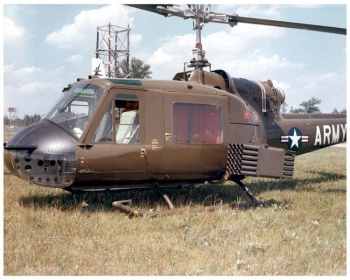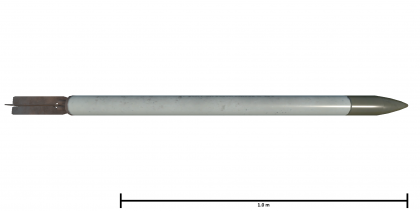FFAR Mighty Mouse
Contents
Description
The FFAR Mighty Mouse or Mk 4 Folding-Fin Aerial Rocket is a 2.75 inches (70 mm) diameter unguided rocket utilised by military aircraft. This rocket was primarily developed for interceptor aircraft which would utilise them for shooting down enemy bombers which proved difficult to shoot down with guns and cannons at the speeds at which they were travelling. While initially developed for air-to-air combat, the FFAR was found to be very effective when utilised in air-to-surface operations.
Unlike traditional missiles with fixed fins, the FFAR's fins were in a folded position when loaded in a launch tube. Upon the missile being launched and departed the launch tube, the folding fins would flip out into place to help stabilise the spin-rate of the rocket. While a single rocket could by itself bring down a bomber, due to it being unguided, accuracy was not on the side of the attacking pilot. To compensate for the inaccuracy of the rockets, they were usually launched in volleys to increase chances of hitting the target.
By the late 1950s, rockets had largely been removed from air-to-air service and were being fitted to helicopters for an air-to-ground role. For helicopters, a volley of rockets was found to be just as effective as a cannon, however, the rockets were lighter and did not cause recoil that the cannons produced.
The FFAR was given the nickname Mighty Mouse after the famous cartoon character of the time which featured a mouse with superpowers and the ability to fly and was known to sing a famous line "Here I come to save the day!" when he flew into action.
Vehicles equipped with this weapon
| Vehicles equipped with this weapon | |
|---|---|
| Jet fighters | |
| F3H | F3H-2 |
| F8U | F8U-2 (Modification) |
| F11F | F11F-1 |
| F-1 | F-1 · T-2 |
| F-4 | F-4C Phantom II · F-4E Phantom II · F-4EJ Phantom II |
| F-5 | ␗F-5A |
| F-89 | F-89D |
| F-100 | F-100D · ▄F-100D |
| F-104 | F-104C · F-104S |
| G.91 | G.91 pre-serie · G.91 R/1 · G.91 R/4 · ◄G.91 R/4 · G.91 YS |
| Strike aircraft | |
| A-4 | A-4B · A-4E Early |
| A-7 | A-7D |
| AD-4 | AD-4 |
| AV-8 | AV-8A · AV-8C |
| F-84 | F-84F · ◄F-84F · ▄F-84F · ▄F-84F · F-84F IAF |
| FJ-4 | FJ-4B · FJ-4B VMF-232 |
| Attack helicopters | |
| A.109 | A.109EOA-2 |
| A-129 | A129CBT · A-129 International (p) |
| AH-1 | AH-1F · AH-1G · ▅AH-1E · AH-1S · AH-1S Kisarazu |
| EC-665 | EC-665 Tiger UHT |
| H-34 | H-34 |
| Utility helicopters | |
| BO 105 | BO 105 CB-2 · BO 105 PAH-1 · BO 105 PAH-1A1 |
| SA.341 | SA.341F Gazelle · SA.342M Gazelle |
| UH-1 | UH-1B · ▅UH-1B · UH-1C · UH-1C XM-30 · ◄UH-1D |
General info
Tell us about the tactical and technical characteristics of the rocket.

Effective damage
The FFAR Mighty Mouse is a straight forward unguided high-explosive rocket which can be configured for either a contact fuse, timed fuse or an automatic detonation fuse once the rocket propellent has run out. If the rocket explodes within close proximity of a target aircraft or vehicle, it will still cause splash damage and still potentially disable or destroy the target.
Comparison with analogues
Give a comparative description of rockets that have firepower equal to this weapon.
Usage in battles
Due to the size and inaccurate nature of the FFAR Mighty Mouse, this rocket is best used against slower moving targets like bombers, hovering helicopters, aircraft parked on a runway and other lightly armoured targets. When attacking bombers, it may be necessary to fire off the entire volley of rockets in one shot to increase the chance of hitting the target. For aircraft parked on the runway, helicopters or other lightly armoured targets it may only be necessary to fire off several rockets to ensure a hit, but not the entire volley. Several rocket attacks may be required due to the inaccurate nature of these rockets.
Pros and cons
Pros:
- Enough explosive value to take out a bomber
- Lightweight
Cons:
- Extremely inaccurate, best to fire off multiples
- Requires using many to increase chances of hitting a target
- Like firing a shotgun, some may hit a target
History
Examine the history of the creation and combat usage of the weapon in more detail than in the introduction. If the historical reference turns out to be too long, take it to a separate article, taking a link to the article about the weapon and adding a block "/History" (example: https://wiki.warthunder.com/(Weapon-name)/History) and add a link to it here using the main template. Be sure to reference text and sources by using <ref></ref>, as well as adding them at the end of the article with <references />.
Media
See also
Links to the articles on the War Thunder Wiki that you think will be useful for the reader, for example:
- reference to the article about the variant of the weapon;
- references to approximate analogues by other nations and research trees.
External links






